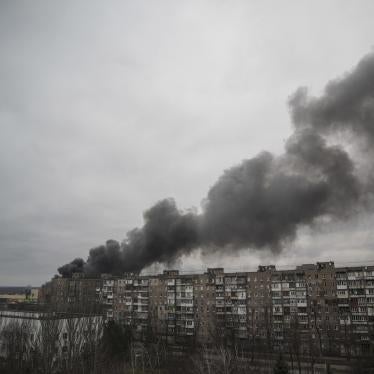Thank you, Chairperson.
The current draft declaration has incorporated many of the changes we previously recommended, and we welcome and appreciate your continued work on this text.
Section 1 of the draft now more accurately reflects the gravity of the harm suffered by civilians and emphasizes the need for the commitments listed in Sections 3 and 4. It should be further refined, however, including by sharpening its description of the different types of harms caused by the use of explosive weapons in populated areas and by expanding its data collection and sharing paragraph.
While the qualifier “can” was appropriately deleted in most places, including the title, it still unnecessarily weakens references to certain well-documented civilian impacts of explosive weapons, including psychological, psychosocial, and environmental harm. The word should be removed in the relevant places of Paragraphs 1.2 and 1.3.
Also in Paragraph 1.2, the phrase “[b]last, debris, and fragmentation effects” should be amended because debris, while hazardous to civilians, is not an effect in itself. The sentence could be rewritten as “Blast and fragmentation effects and resulting debris cause….”
We recommend that Section 1 of the declaration insert a new paragraph addressing the concept of “wide area effects.” The phrase “wide area effects” was correctly removed from most of the declaration. Victim assistance, for example, should be provided to those affected by the use of all explosive weapons in populated areas. But the phrase is important for Paragraph 3.3 in the operative section of the declaration, which should include a commitment to avoiding the use of the subset of explosive weapons that is most dangerous.
The new paragraph should recognize that the wide area effects of certain explosive weapons exacerbate the harm to civilians and clearly describe wide area effects. It should state that weapons have wide area effects if they (1) have a wide blast and fragmentation radius, (2) are inaccurate, (3) deliver multiple munitions at once, or have a combination of those factors.
In Paragraph 1.4 and Section 3, the term unexploded ordnance should be replaced with the broader term “explosive ordnance,” which also captures mines and improvised explosive devices. It should also be noted that explosive ordnance causes harm during as well as “long after hostilities have ended.”
In paragraph 1.6, we welcome the inclusion of a reference to tracking civilian casualties in addition to recording them. Tracking suggests monitoring harm and analyzing patters in real time rather than simply capturing total casualty numbers at a single moment. The paragraph should be strengthened, however, by removing its superfluous caveats, such as “where feasible.” In addition, it should recognize the need to collect and share data on the range of civilian impacts, including harm to civilian objects, as well as on the specifics of the operational use of explosive weapons in populated areas, such as the types and numbers of weapons used, the locations and intended targets, and the circumstances of use.
Finally, we recommend that in Paragraph 1.7, “short and long-term humanitarian consequences” be amended to “direct and reverberating effects” to be parallel with other parts of the declaration. In general, the new draft better distinguishes between different categories of harm, referring to direct effects, which are caused at the time of attack, and indirect (also known as reverberating) effects, which it describes as being “severe and long-lasting.” While Human Rights Watch, INEW, and others have seen value in a more nuanced, three-tiered distinction, what matters most is that the declaration addresses the harm comprehensively and consistently. It generally does so, but this paragraph is one place where it uses different terms.
We have provided more specific comments on other paragraphs in our written submission.
Thank you.








